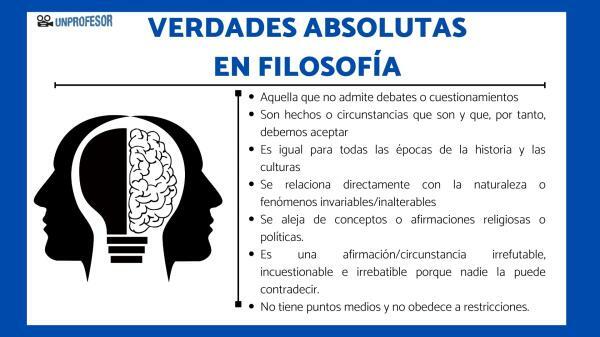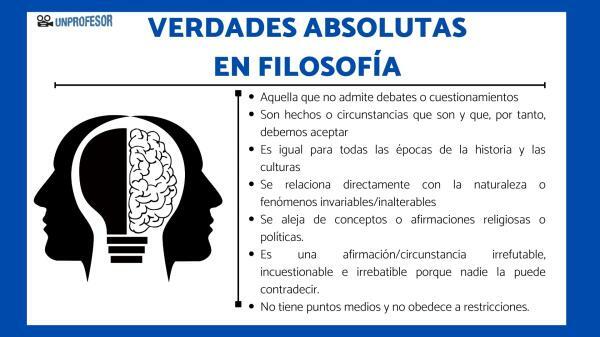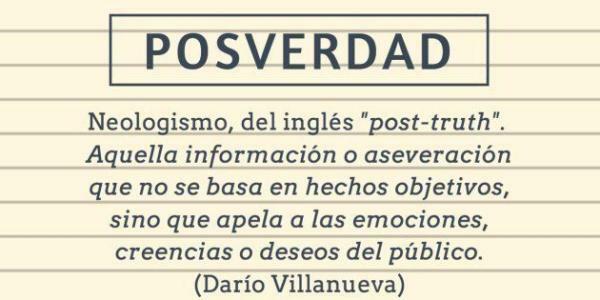What are the ABSOLUTE truths in philosophy and EXAMPLES

In today's class we are going to analyze one of the most interesting questions: what are absolute truths in philosophy. are those claims that are irrefutable, unquestionable and irrefutable because no one can contradict them and they are the same for all periods of history.
However, our philosophical concept of truth was formulated by Aristotle and comes from the Latin true and from the Greek aletheia, whose meaning is without veils or the unveiled. If you want to know more about the absolute truth, keep reading this lesson from a PROFESSOR because we explain everything to you with examples. Let's start!
Currently, the RAE define truth as:
- The conformity of things with the concept that the mind forms of it.
- The conformity of what is said with what is felt or thought.
That is, it would be the direct relationship that exists between what we know, what we say/affirm and what we feel. Hence, this concept is also considered synonymous with honesty or sincerity and opposite of lying (the opposite of what is known).
Likewise, if we approach the philosophical concept of truth, we have that our conception starts from Aristotle. For whom the truth is related to knowledge and resides in the soul: It is the being or that which is would be the truth and non-being or that which is not it would be the lie.
“…Being considered as the true, and non-being as the false, mean from one point of view, the true when there is a meeting, the false when there is no meeting (...) In this case the truth is the thought that one has of these beings, and then there is no falsehood or error; there is nothing but ignorance, which does not resemble the state of the blind, because the state of the blind would be equivalent to not having the ability to conceive at all…”. Metaphysics
Ultimately, in philosophy we can define truth as the agreement between thought-reality and the relationship between subject (intelligence) and object (reality).
The absolute truth is that which does not admit debates or questioning, are facts or circumstances that are and that, therefore, we must accept. Also, It is the same for all periods of history and cultures..
That is why the absolute truth is directly related to the unchanging/unalterable nature or phenomena and moves away from religious or political concepts or affirmations.
Definitely, an absolute truth is an irrefutable statement/circumstance, unquestionable and irrefutable because nobody can contradict it. It has no midpoints and obeys no constraints.

So that you better understand what an absolute truth is, we will explain it to you with several examples of absolute truths:
- We all die: Death is the first great absolute truth and is the cessation of vital functions. It is an unquestionable certainty, before which, different cultures have created all kinds of beliefs to try to explain something that we do not understand and that causes us anguish.
- The earth spins around the sun: For a long time it was thought that the Sun revolved around the Earth; However, during the Renaissance, Copernicus Y Galileo Galilei They showed that it was the other way around. In fact, Galileo was the victim of an inquisitorial process for questioning what until then was taken as an absolute truth that in reality was not.
- We are all born from the relationship of a woman and a man: Regardless of our sexual orientation, it is unquestionable that an egg and a sperm or a female gamete and a male gamete are needed to be born.
Other examples of absolute truth
- Ice is solid.
- Water boils at a temperature of 100 degrees.
- A kilometer is made up of a thousand meters.
- Antarctica is the only continent that is not inhabited by people.
- Velazquez painted The Meninas.
- Vegans do not eat meat or fish.
- The capital of Egypt is Cairo.
To end this lesson about absolute truths in philosophy, we also have to talk about two other types of truths.
relative truth
It is the opposite of absolute truth, it is the notion that states that The absolute truth does not exist, that is, what may be true for one person is not true for another. Therefore, it is an affirmation that we cannot give as true permanently, since, can be refuted, obeys more to a point of view, is linked to a culture and a specific time.
“…Nothing is what it seems: the absolute truth and the truth relative...”Tashi Tsering
Thus, an example of relative truth could be the sensation of heat or cold: For a Spaniard the winter in Spain is cold, but for a Russian it will be the opposite, it will be hot.
post-truth
This concept is relatively modern and has its origin in the English neologism post-truth What does it mean after the truth. Thus, post-truth is usually defined as a statement that alludes to facts that are not very credible or as "a truth" that can influence the creation of an opinion and that is based on what sentimental.
Ultimately, post-truth is a distorted and manipulated truth consciously to influence public opinion. Like for example fake news, where a lie becomes the truth.




